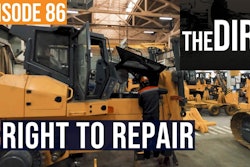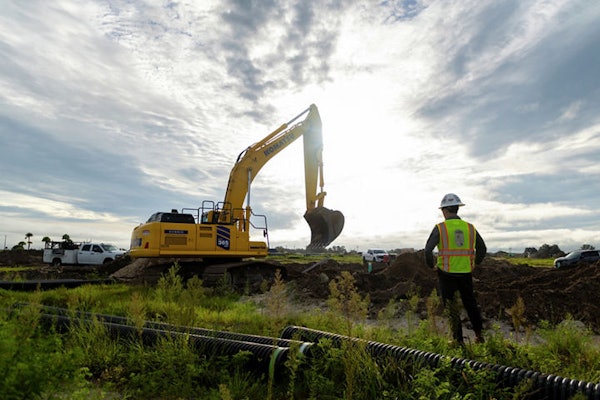With talk of a downturn on the horizon, now is the time to start preparing for potentially lean times.
On this episode of The Dirt, we hear from Scott Peper, CEO of commercial construction lender Mobilization Funding LLC, about what contractors need to do to weather a recession. One big concern in particular is cashflow, especially when payments on projects start to slow, and projects get canceled or delayed.
Along with helpful tips, he pinpoints contractors’ biggest mistake when it comes to cashflow. His company also offers a free online cashflow calculator to help contractors meet their margins and hopefully end up with profits on their jobs.
Other topics he discusses include how to handle equipment, debt and layoffs during a recession.
Though a recession is inevitable at some point in our cyclical economy, it doesn’t have to be the end for your business – and in some cases, it could open up opportunities.
So if you’re worried about the next construction slump and want to be prepared, check out the latest episode of The Dirt to learn how you can be ready and maybe even thrive.
Equipment World serves up weekly videos on the latest in construction equipment, work trucks and pickup trucks – everything contractors need to get their work done. Subscribe and visit us at equipmentworld.com!
In this episode:
00:00 - Intro: Managing Cash Flow
00:50 - What Businesses Will Survive the Recession?
02:49 - How the Recession Will Reset the Economy
04:11 - Focus on the Opportunities
04:50 - Best Practices for Managing Cashflow
06:52 - How to Be a More Efficient Business
07:47 - Things You Shouldn't Compromise On
09:28 - What Should You Do About Debt?
12:56 - Understanding Project Cashflow
15:30 - Cashflow Management Tool
Bryan (00:00):
Hi, everyone. Welcome back to Equipment World. You're watching The Dirt. I'm your host, Bryan and today I want to talk about... Well, it's looming in the distance, we can all see it now. Let's talk about the recession and more importantly, how do you manage cash flow as a business as we're staring down the barrel of a recession? That's a scary thing.
(00:26):
Well, here to talk with us about that is Scott Peper from Mobilization Funding. These guys are funding experts for our industry, so they understand the ins and outs of cash flow management when you have to spend the next six months funding a project that you won't get paid for for probably another six months on top of that. So without further ado, we're going to talk with Scott about how we should start thinking about our funds as we go into the slowdown.
Scott (00:51):
I mean, look, anytime there's problems out there, not everybody can survive those problems. So the ones that do, they're running their business really well or if they're not, they're forced into doing things that they might not have done before to make sure they can survive.
(01:05):
All those opportunities can really create a better business and give you good motivation that you might have needed or that extra little hump to push you forward. I think in general too, nature runs its course, not everybody's going to make it through hard times. So the companies that aren't doing the right thing or we're surviving because of the bigger macroeconomic factors. For example, in the construction world, you have lots of companies that just go try to bid on price and they bring the overall price down. So the companies that are focusing on good work, good margins, so they can give back to their employees, run a good business, make it through the natural cycles of the economy, they're going to survive.
(01:44):
And those companies should be rewarded for doing that. So everybody goes through the pain but not everybody gets the reward on the other end, and I think it's important to focus on that. I would also tell you the best projects get done during a recession too, because if it's not a good project or it was a little bit on the edge or it was some developer taking a flyer and it wasn't going to be successful, you're not on that project.
(02:06):
So you're not going to suffer along with them. So you got to look at those things too. And it just gets back to the focus I always like to tell our clients and anyone that listens to us is, performance is the most important thing that you should focus on. Not cash, not price, it's performance, lead with your performance, your ability to do the jobs. That's what everybody wants.
(02:25):
They want a great job or a great project. Of course, they want at the best price, but they don't want the best price and then maybe you get the job done. They want you to be able to show them and prove them that and I can knock this job out. I'm the best at it. Here's the reason why. That why price is the way it is. It's not overpriced. It's just what the right price is to get this done the best efficient, most economical way for me and my boys and you and your project and that's what they should focus on
Bryan (02:49):
I couldn't agree with you more. One of the things that I've always said is we've kind of looked down the road at a recession because it's cyclical. It's going to happen at some point in time. And what I've always said is as much as the industry views that as such a negative thing, because things do slow down. I mean, you have to admit, things will slow down. But at the same time where in an industry where everyone recognizes it's this giant race to the bottom of who can do the job that cheapest and in the least amount of time and working the most hours. And then on top of that, we've thrown into the mix. We've got this ridiculous used equipment market because everyone needs equipment because the economy's been pumping so strong. And there's just all of these factors that are all coming to head.
(03:33):
And this recession is kind of like the great reset button. It's going to naturally coal out that bottom tier of contractors that are only in it because there's just been this huge, fat economy to eat off of. They've never had to really make it based off of their actual abilities, they're only making it because there's that much work out there.
(03:53):
As a result of that, more used equipment's going to come back on the market, which is going to cause the used market to come down in price back to a reasonable number. I couldn't agree more that there's a lot of positives that people don't think about when they think about something like a recession. People only think about it as the big, bad, scary thing,
Scott (04:11):
Yeah. Or they focus all their energy attention trying to make it stop and you can't. It's going to happen, so you're much better focusing on where the opportunities are. Some of the best and brightest companies, if not all of them, they are founded when there's big problems and they solve them. That is the key and if you do it, then just think about what speed and pace you're going to be running at when you get that tailwind back. And you're on the other side of the recession and all the macroeconomic factors are working with you, not against you. Think about how awesome it's going to be, and you'll be perfectly poised for that. And while everyone else either didn't survive or sat on their hands, waiting for the next big wave to come, you're already running full speed, taking advantage of it.
Bryan (04:50):
So that being said, what are some best practices that contractors can use to manage their cash flow as they start to pull back and start to get a little more conservative?
Scott (04:59):
It's a good question. I think, the first thing I do is take a deep dive into your business. Where is the fat in your business? Are you spending money that you don't need to spend? Do you have extra vehicles and trucks that you're leaving, hanging around right now? If you have a high used market right now and you don't really need the trucks, don't worry about it. You'll find another truck, it'll be fine. And most likely it'll probably be less costly.
(05:18):
So get rid of the extra equipment that you don't need. There's a lot of people in your office that you probably had around a long time. Most of which are probably very beneficial and needed and some may not be. So I would just take a look at all the positions. If you have some family members laying around that aren't pulling their weight. Maybe you combine some jobs there and have them do some other things or find them a better home somewhere else.
(05:41):
Your business has to survive, and you don't need to be the only source of paycheck for everybody here now, so I would look at that. And actually, I stole that directly from one of my clients who told me that, said this downturn, it was a COVID. She said, "Look, that got me to really have those tough conversations with some of my family members that I didn't want to have."
(06:00):
And then I think the next steps really are, you really got to dial into your budget. You have to build the budget. If you're not, you have to know exactly where that budget is, and I think it starts at the project level for our contractors. Contractors are great at understanding what their costs are and they're great at understanding what the schedule they need to keep for their projects.
(06:19):
But knowing how much of that cost do you actually have to invest into that project before you start. You might have 20% margin in and that's great. But do you have to spend a hundred percent of that cost before you actually break even on the project, or you only have to spend 20 or 30% of that cost before you break even.
(06:34):
Those are the things that are important to know. You don't want to get stuck without cash or not knowing where your cash is coming from in the middle of a recession because there's going to be, not only contractors that don't do well, but there's going to be developers and general contractors that don't make it. And you don't want to go down with one of them because you're expecting everything to go perfectly.
Bryan (06:52):
I would like to add to, just along those lines of doing things, to tidy up around the office. It really plays into a lot of the conversations we've had here on The Dirt is, now is a fantastic time to start looking into tools that are going to make your business more efficient, whether that is software models that are going to help you do takeoffs, or if it's adding machine control to some of your machines.
(07:14):
So that instead of having two or three individuals out on a job site keeping grade, now you've got one machine doing that work with one operator. Anything you can use technologically to advance your business and become more efficient, now is actually a fantastic time to invest in that because it is helping you. Yes, you're spending the money now, but it's helping you hunker down and become more efficient for the lean times. Would you agree with that?
Scott (07:39):
I do think it's a good time to look at technology for sure. If there's a way to help add a piece of technology that can help save money, I would do it. The one thing I would caution folks on though is where a lot of people tend to go look at it these times and they cut their budgets, they cut people, they change on the value they're trying to deliver to customers.
(08:00):
I would really make sure you're not doing that. This is the time to pour into your customer, make sure your customer knows that you're doing the right thing and that you're always going to do the right thing. Deliver even better service to them.
(08:11):
In down times, people are expecting bad things to happen. Why is that good? Well, when you deliver great things or you can over deliver someone's expectations at a downtime, a lot easier than you can over deliver in the good times.
(08:25):
And so if your customer's expecting things to be hard, they're just waiting for one subcontractor or the next contractor to come in with bad news. And you're not doing that, you're really shining. So pour your focus back into your own business, where you can lean out.
(08:39):
Don't change on the customer and also don't change on all your employees. It's not the time to cut their healthcare bag. There's probably people or positions that can be cut, not necessarily cuts for everyone. I'd be more of an advocate of cutting the folks that you probably need to cut and haven't, that everyone else by the way, knows you should.
(08:57):
And keeping half of that for the business and putting the other half of it back into your employees. Think about that. I mean, if you could save a hundred thousand dollars in a position and you gave 30 or 40,000 of it to the rest of the employees that were there, they're not expecting something like that either and you're still saving. So I would be an advocate of doing things like that versus cutting everybody 10% or cutting across the board healthcare benefits or something that impacts everyone or taking away cell phones. Get rid of the folks that don't need to be there.
Bryan (09:27):
So now let's shift gears a little bit. And I want to talk about debt because for everybody, debt going into a recession is this huge, terrible thing. You need to offload every bit of debt you can so that you can really kind of hunker down. It is having debt, a terrible thing, going into a recession. How should contractors think about that conversation?
Scott (11:01):
I'll answer like this. Yes, debt is terrible going into a recession but not all debt. If you have debt on things that you're not supposed to have debt on, you can survive in the good times. But when you have debt on things that you're not supposed to, it's going to show up quick and it's going to show up fast and it's going to be what brings you down. So I'll expound on that.
(11:21):
What I would say is, yes, it's bad when it's not congruent with your business needs or it's not congruent with how your business is paid. For example, if you took on a bunch of debt in the form of a merchant cash advance for example, and if nobody knows what those are, those are the loans that you get a big deposit and then you're making daily or weekly payments at a very high rate. And you're doing that because you wanted to grow your business and you had shortfalls and payroll and you were starting new projects.
(11:50):
You haven't cleaned out the fat in your business. You haven't done all these other things. That's why you don't have enough cash, but you've got this loan. And now you invoice once monthly and you're paid 30 or 40 days later, but now you're making daily and weekly payments.
(12:02):
Yeah, that loan's going to be a big problem. That's a big problem of debt. If you have lines of credit with your bank and you pull that cash out and you're paying a little bit of debt because you want to make sure your cash reserves are a good spot, then no, that's great debt to have and great access to debt too.
(12:19):
If you have an SBA loan that you've closed to help you recapitalize some of previous sins of the business, great loan to have. Or loan program, for example, if you have specific project-based loans, whether it's us or somebody else and it's helping you execute good work that you have a good margin on and you're doing well with, and you're going to pay that back with the project you're on. No, that's great debt too. It's helps you grow. Anything that's helping you put money in your pocket is great. Any debt that's helping you cover up a problem or fix a problem that you don't want to address or that you created. It's probably bad debt now.
Bryan (12:56):
So my final question is, what's one thing you wish all contractors would do that would dramatically improve their business success or their personal happiness?
Scott (13:05):
Project's cash flow, I think is the biggest miss. Let me explain that. Over the last 10 years we've been in business, it's what we've found to be the biggest problem. And it's not that the contractors don't understand it, it's that they don't have the information in front of them beforehand.
(13:20):
So what I said before was there's two things contractors do really well. They know what their costs are overall, and they know what the schedule they need to keep is. And if they were to get on a job today and do it all tomorrow and the next day and invoice the entire thing two days from now, that cost structure and that invoice would be perfect and they'd make the margin they make.
(13:41):
Unfortunately, that's not how construction works. Projects last month, two month, three months or more. So what's important is the third missing piece, is to build a project cash flow that will tell you how are you going to spend that cost that you have estimated on the project?
(13:56):
So for example, you got a million-dollar job and you got $800,000 of cost and you're going to make 200 grand, it's probably a good job. Most people are going to run into that. But based on your supplier, based on the schedule, based on terms you have with the other vendors, do you have to spend all 800,000 of that before you break even on the job. Or do you only have to invest 250 or 300,000 of that job before the job starts to carry itself?
(14:22):
And that's a piece that a lot of contractors and I would say most, they don't truly understand going into the job. They find it out somewhere in the middle and sometimes it's a big problem. And so if you're in a spot where you feel like you got this great job, you know have a great margin and you're saying to yourself, "Oh man, if my customers just paid me sooner, I'd be good."
(14:43):
That's exactly what I'm talking about. We built a cash flow tool for us to be able to analyze to make loans. And we provide that cash flow tool 100% for free. Anyone go on our website and download it, you'll know week by week, exactly where you are. How much cash you have to spend? When you break even? In advance of ever starting a job with the cash flow tool.
(15:04):
And what we found is contractors, when they have that information up front and advance, they make unbelievable decisions. Oftentimes, they don't even need a loan from us anymore because they can go to their supplier and get 45-day terms instead of 30, or they say, "Oh, you know what? I don't need to order that now." Or "Hey, I'll put two crews on this project instead of one or "I'll cut back." They're extremely resilient and they know every single lever to pull. What things they can and can't do to fix it. It's just, they just need the information up front.
Bryan (15:30):
And just out of curiosity, what's the website that people will go to look at your cash flow management tool?
Scott (15:36):
You can go to mobilizationfunding.com. On the upper right-hand corner, you can click on our resources page, and it'll say, Cash Flow Tool. Takes you right to the cash flow tool. All you have to do is just answer the questions from your bid. When your payroll's due? How often you pay folks?
(15:54):
It just... very easily, it's not a spreadsheet and you have to calculate. Just walk you through and you answer the questions and then we email you two things. The PDF of your answers and the Excel file with the instructions on how to use it and what it means. We don't spam you or email you. We have to email you the sheet, but we don't market to you or bombard you with it. So we email it to you and that's it.
Bryan (16:17):
Awesome. Well, Scott, thank you so much for all the information today. This has been really helpful.
Scott (16:22):
Bryan, I appreciate it. I love what you guys are doing for our construction world. So please keep it up and I just appreciate you giving the opportunity to add any value I might be able to.
Bryan (16:30):
Well, thank you again for Scott coming on the show and giving us all that great information that was really sound advice delivered really well. And I really hope that's able to help you guys and maybe reframe the way you think about this oncoming recession.
(16:44):
It doesn't have to be the scary monster that it sounds like it will be. And between you and me, I could be wrong, but I feel like our industry isn't going to hurt as bad as we have in the past. Simply because first of all, the labor force shortage.
(16:59):
There's still so much work on the table and no one to do it. But I feel like there's still going to be some momentum in the industry just from that. Let alone we also just pass the infrastructure bill, which is a phenomenal amount of money that's pouring into our industry, even as we head into this decline.
(17:15):
So that being said, I hope this has been helpful. We always appreciate you guys watching. We'll catch you guys on the next episode of The Dirt.










